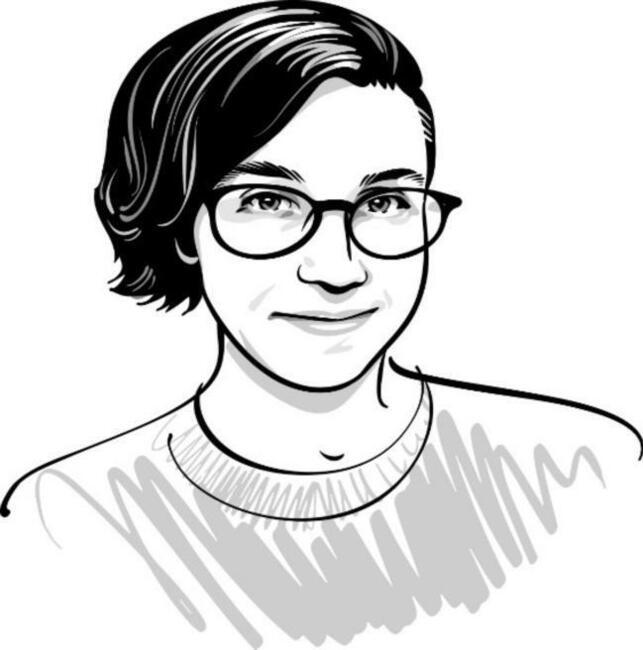September 2023: Handpicked
Each month, the Yiddish Book Center asks a member of our staff or a special friend to select favorite stories, books, interviews, or articles from our online collections. This month, we’re excited to share with you picks by Mindl Cohen.

Madeleine (Mindl) Cohen is the academic director at the Yiddish Book Center. Mindl has a PhD in comparative literature with an emphasis in Jewish studies from the University of California, Berkeley. She is a western Massachusetts native who grew up in Greenfield and attended Hampshire College, where her studies focused on German and German-Jewish literature. As an undergraduate, Mindl participated in the Yiddish Book Center’s Steiner Summer Yiddish Program, which set her on the path of Yiddish studies, and more recently she was a Yiddish Book Center Translation Fellow. Before coming (back) to the Center, she worked as the editor in chief for In geveb: A Journal of Yiddish Studies and taught Yiddish language at Harvard University. Mindl also teaches as a visiting lecturer in Jewish studies at Mount Holyoke College.
Kathryn Hellerstein’s oral history “Malka Heifetz Tussman, Yiddish Poet, My Mentor and Friend”
Kathryn Hellerstein’s book A Question of Tradition: Women Poets in Yiddish is one of the key works of scholarship on Yiddish women writers. I have always treasured Hellerstein’s stories of learning with the poet Malka Heifetz Tussman when Hellerstein was a grad student at Stanford University; it makes Tussman feel so close and highlights the importance of relationships among women in the study and translation of Yiddish literature.
“Why Read Celia Dropkin,” by Faith Jones
Faith Jones is a role model for me as a librarian, researcher, translator, and especially as a mentor—Jones champions the work of women writers and the work of her colleagues and students, and you can see that in her article from Pakn Treger about Dropkin. Jones translated a collection of Dropkin’s poetry with co-translators Jennifer Kronovet and Samuel Solomon—the work of co-translation is also a model of working collaboratively to highlight the artistry of women writers.
“To Rosa Palatnik,” by Rokhl Kramf, translated by A. C. Weaver
In 2022 the Pakn Treger Digital Translation Issue focused on the theme of women’s experiences. One of my favorite pieces in that issue is A. C. Weaver’s translation of this poem by Rokhl Kramf, “To Rosa Palatnik.” I love it for its brief lines, which Weaver has carefully translated, and for its focus on a relationship between two women writers. Weaver was a fellow at the Yiddish Book Center, and we worked together editing both the 2020 and 2021 Pakn Treger Digital Translation Issues, so for me reading their beautiful translation is also a record of our relationship reading, editing, and translating together.
Zohar Weiman-Kelman’s book Queer Expectations: A Genealogy of Jewish Women’s Poetry offers a model for a queer studies approach to reading Jewish women’s literature, showing how Jewish women writers and we as scholars and translators can forge our own literary relationships across borders like time, language, and nation. This lecture by Weiman-Kelman shows how they bring women writers, including Emma Lazarus, Anna Margolin, and Irena Klepfisz, together across these borders.
“Di Froyen Now”: Irena Klepfisz in conversation with Agi Legutko
In November 2022 we hosted a wonderful weekend program called “Di Froyen: Celebrating the Women of Yiddish Literature.” The whole weekend was a demonstration of partnerships and collaboration across generations and organizations that have led to the current moment of celebrating and taking seriously the work of women writers. This recording of a keynote conversation between Irena Klepfisz and Agi Legutko showcases the themes of the weekend: intergenerational relationships, recollections about the important Froyen conference in 1995, and discussions about what has been accomplished and what work remains to be done.
“During Sleepless Nights,” by Anna Margolin, translated by Daniel Kennedy
This is another translation published in our 2022 Pakn Treger Digital Translation Issue that highlights an additional impactful aspect of the efforts to translate more Yiddish women writers: Anna Margolin has long been well known in Yiddish literary circles as a gifted and enigmatic poet, celebrated and perhaps also mourned for the one slim volume of poetry she published during her life. Yet recent research has explored Margolin’s prolific career as a writer for the Yiddish press, in which she published fiction and editorial content under several pen names. Daniel Kennedy’s translation of this short story, and his recently published volume During Sleepless Nights and Other Stories, dramatically expands our understanding of Margolin’s writing beyond her poetry.
Q&A
Tell us about your selections and what they say about your relationship with Yiddish language and culture.
It is such a pleasure to share selections from our collections for Women in Translation Month, and I am spoiled for choice. We are so lucky to be in a moment where many talented, dedicated, creative people are focused on researching, translating, and sharing writing by women in Yiddish. What struck me in assembling these selections is how essential relationships are to all of them, especially relationships between women and across generations. In Kathryn Hellerstein’s oral history about how she was mentored by the poet Malka Heifetz Tussman, she ends by saying: “She made me humble, and rightfully so, about what it means to translate a poem.” I feel humbled by this work of translation that brings a writer’s voice to a new audience and a new generation. Each of these selections shows how literature and literary translation occurs in community, communities I’m grateful to be part of.
What are you working on next?
We are in the midst of reviewing submissions to our “Yiddish in the South” translation theme, and I’m excited to start publishing some of these new translations this fall. Submissions are still open and being reviewed on a rolling basis; I hope more people reading this will share their work!
